
▲ Master Wang Qi
Recently, some friends have complained that with the rising temperatures and increasing humidity, their faces have become increasingly oily, their makeup easily smudges, and they have developed many pimples.For those in the “battle against acne,” your pimples may not be solely caused by external damp-heat; perhaps the “damp-heat” is within your body!Today, I will share some tips for eliminating damp-heat from the body.1. Manifestations of Damp-Heat ConstitutionLet’s look at a few case studies.Case Study 1A boy who just finished his college entrance examination has severe acne, and his face has been scratched to the point of scarring. He has taken a lot of Western and Chinese medicine, tried many topical and internal treatments, but with little effect. Besides the acne, he is irritable and often loses his temper. His family thought it was due to the stress of the exams, so they didn’t pay much attention, but now that the exams are over, his temper is still as bad. Upon examining his tongue coating, it is very yellow and greasy.Case Study 2Chen, a 28-year-old girl from Northeast China working in Beijing, is very distressed because she is at the age to consider marriage, yet her boyfriend keeps breaking up with her. Why? Because of her bad breath. She feels that everywhere she goes has a foul smell. Upon examination, her face is very oily; when I pressed a piece of white paper against her face, it showed oil stains. She often experiences dry mouth and bitter taste but doesn’t like to drink water. She also told me that she can’t stand the summer in Beijing, which is hot and humid with heavy fog.The above two cases are typical examples of a damp-heat constitution leaning towards internal damp-heat accumulation.Case Study 3An elderly man over sixty claims he has excessive sexual desire and is easily aroused, which makes his partner uncomfortable. When asked about other symptoms, he says he often feels his scrotum is damp and sweaty, and he has to change his shorts daily to feel comfortable. He also wakes up with a dry mouth and bitter taste, and he has a bad temper, often losing his cool for no reason. His partner and son find it hard to bear. The old man insists he doesn’t mean to get angry; it just happens inexplicably.Case Study 4Chen, a 26-year-old female officer in the military, has thick, yellowish vaginal discharge with occasional odor, and she feels the need to shower and change her shorts daily to feel comfortable. Initially, she thought she had a gynecological issue, but after examination at the hospital, everything was normal. Upon further questioning, the female officer mentioned she often feels dizzy, as if something is wrapping around her. Sometimes her body feels swollen, and when pressed, her lower limbs leave an indentation. Upon examining her tongue, it is red with a yellow, greasy coating, and her pulse is slippery and rapid.The last two cases are typical of a damp-heat constitution leaning towards damp-heat descending.From the above, we can conclude that the manifestations of a damp-heat constitution mainly include: oily facial skin, dry mouth with a bitter taste, heaviness and fatigue in the body, prone to acne and pimples, red tongue, yellow greasy coating. The body may be overweight or emaciated, with irritability and restlessness, red eyes, short and red stools, men prone to dampness in the scrotum, women prone to increased vaginal discharge, and a slippery and rapid pulse. Such individuals often have an irritable temperament and are prone to conditions like sores, jaundice, etc. They find it difficult to adapt to humid environments or high temperatures, especially during late summer and early autumn when damp-heat is prevalent.Additionally, those with a damp-heat constitution are also prone to eczema, oral ulcers, and cholecystitis.2. Sources of Damp-Heat“Dampness” can come from external sources, such as humid weather, getting wet in the rain, or living in damp conditions, leading to external dampness invading the body; it can also originate from internal sources, mostly due to bodily deficiency, poor digestion, or overeating, especially consuming too much greasy or sweet food, which hinders the spleen’s ability to “transform and transport” fluids, resulting in “internal dampness accumulation.”Heat is also a pathogenic factor that easily combines with dampness, much like oil and flour mixing together.One should notice that during the long summer months, a common feeling is a poor appetite. Why is this? The “Suwen: Discussion on the Timing of Organ Qi” states, “The spleen governs the long summer,” indicating that the spleen is easily affected by the dampness of the long summer. The spleen’s nature is to prefer dryness and dislike dampness, so if one frequently consumes excessive alcohol or cold foods, it affects the spleen’s ability to transform and transport fluids, leading to a mixture of dampness and heat that becomes difficult to resolve over time. In daily life, there are many factors that can lead to a damp-heat constitution, with alcohol being the primary culprit. Alcohol is a beverage made from rice, wheat, corn, sorghum, and fermentation, which is essentially water and inherently damp, and it generates heat during fermentation. Therefore, alcohol is a product of damp-heat, and long-term or excessive drinking can lead to damp-heat accumulation. Thus, I advise against excessive drinking to prevent damp-heat.
In daily life, there are many factors that can lead to a damp-heat constitution, with alcohol being the primary culprit. Alcohol is a beverage made from rice, wheat, corn, sorghum, and fermentation, which is essentially water and inherently damp, and it generates heat during fermentation. Therefore, alcohol is a product of damp-heat, and long-term or excessive drinking can lead to damp-heat accumulation. Thus, I advise against excessive drinking to prevent damp-heat. 3. Methods for Regulating Damp-Heat ConstitutionFirst,learn to shift your emotions. When feeling troubled or distressed, quickly redirect your attention to other aspects. This helps individuals with a damp-heat constitution alleviate their irritability, leading to a peaceful state of mind, which naturally aids in regulating the damp-heat constitution.
3. Methods for Regulating Damp-Heat ConstitutionFirst,learn to shift your emotions. When feeling troubled or distressed, quickly redirect your attention to other aspects. This helps individuals with a damp-heat constitution alleviate their irritability, leading to a peaceful state of mind, which naturally aids in regulating the damp-heat constitution.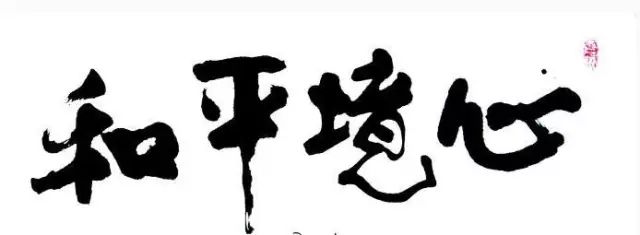 Secondly, individuals with a damp-heat constitution should focus on a light diet, consuming more foods like adzuki beans, mung beans, celery, cucumbers, and lotus root, which are sweet and cold or sweet and neutral. It is also suitable to eat foods that clear and drain dampness, such as coix seed (yi yi ren), lotus seeds (lian zi), poria (fu ling), fava beans (can dou), carp (li yu), winter melon (dong gua), loofah (si gua), bitter melon (ku guo), purslane (ma chi xian), cabbage (bai cai), and water spinach (kong xin cai).Avoid spicy, hot, and overly nourishing foods such as chili peppers, ginger, scallions, and garlic; limit the intake of warming foods and drinks like dog meat, beef, lamb, and alcohol, as well as hot pot, fried, and barbecued foods; individuals with a damp-heat constitution should not consume rock candy, pomegranates, jujubes, or grapefruit, and should especially avoid overeating or eating too quickly; limit salt intake, as it can exacerbate damp-heat.
Secondly, individuals with a damp-heat constitution should focus on a light diet, consuming more foods like adzuki beans, mung beans, celery, cucumbers, and lotus root, which are sweet and cold or sweet and neutral. It is also suitable to eat foods that clear and drain dampness, such as coix seed (yi yi ren), lotus seeds (lian zi), poria (fu ling), fava beans (can dou), carp (li yu), winter melon (dong gua), loofah (si gua), bitter melon (ku guo), purslane (ma chi xian), cabbage (bai cai), and water spinach (kong xin cai).Avoid spicy, hot, and overly nourishing foods such as chili peppers, ginger, scallions, and garlic; limit the intake of warming foods and drinks like dog meat, beef, lamb, and alcohol, as well as hot pot, fried, and barbecued foods; individuals with a damp-heat constitution should not consume rock candy, pomegranates, jujubes, or grapefruit, and should especially avoid overeating or eating too quickly; limit salt intake, as it can exacerbate damp-heat.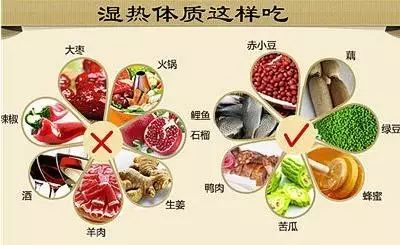 In daily life,avoid living in low-lying, damp areas; it is better to reside in dry and well-ventilated environments, maintain sufficient and regular sleep, avoid staying up late, and do not overexert yourself. After sweating, change clothes frequently. There is an old saying in China, “If sweat is visible, it leads to acne.” Sweating can help expel dampness, but avoid excessive sweating to prevent damaging qi.Individuals with a damp-heat constitution should also avoid wearing synthetic underwear and tight jeans. For those experiencing itching due to damp-heat, avoid hot water, soap, and irritating topical medications, and pay attention to personal hygiene, avoiding scratching the skin.In terms of exercise, the most suitable activities for individuals with a damp-heat constitution are high-intensity and high-volume exercises, such as strength training, middle-distance running, swimming, hiking, various ball sports, and martial arts. These can help expend excess heat and eliminate excess moisture, achieving the goal of clearing heat and draining dampness. However, it is important for individuals with a damp-heat constitution to avoid exercising in hot environments.4. Acupoint Massage for Damp-Heat ConstitutionThe most commonly used acupoints for clearing heat and draining dampness are Feishu (肺俞, Lung Shu) and Bai Liao (八髎, Eight Liao).For those with a damp-heat constitution leaning towards internal damp-heat, presenting with acne and bad breath, the Feishu acupoint is recommended. Feishu is located on the back, below the spinous process of the third thoracic vertebra, two finger widths away from the spine on either side. This acupoint is effective in clearing damp-heat from the lung meridian. When performing the massage, use the tips of the index and middle fingers to press and rub the acupoint 15-30 times, then use both thumbs to push down along the edge of the scapula from the Feishu acupoint 30-50 times.
In daily life,avoid living in low-lying, damp areas; it is better to reside in dry and well-ventilated environments, maintain sufficient and regular sleep, avoid staying up late, and do not overexert yourself. After sweating, change clothes frequently. There is an old saying in China, “If sweat is visible, it leads to acne.” Sweating can help expel dampness, but avoid excessive sweating to prevent damaging qi.Individuals with a damp-heat constitution should also avoid wearing synthetic underwear and tight jeans. For those experiencing itching due to damp-heat, avoid hot water, soap, and irritating topical medications, and pay attention to personal hygiene, avoiding scratching the skin.In terms of exercise, the most suitable activities for individuals with a damp-heat constitution are high-intensity and high-volume exercises, such as strength training, middle-distance running, swimming, hiking, various ball sports, and martial arts. These can help expend excess heat and eliminate excess moisture, achieving the goal of clearing heat and draining dampness. However, it is important for individuals with a damp-heat constitution to avoid exercising in hot environments.4. Acupoint Massage for Damp-Heat ConstitutionThe most commonly used acupoints for clearing heat and draining dampness are Feishu (肺俞, Lung Shu) and Bai Liao (八髎, Eight Liao).For those with a damp-heat constitution leaning towards internal damp-heat, presenting with acne and bad breath, the Feishu acupoint is recommended. Feishu is located on the back, below the spinous process of the third thoracic vertebra, two finger widths away from the spine on either side. This acupoint is effective in clearing damp-heat from the lung meridian. When performing the massage, use the tips of the index and middle fingers to press and rub the acupoint 15-30 times, then use both thumbs to push down along the edge of the scapula from the Feishu acupoint 30-50 times.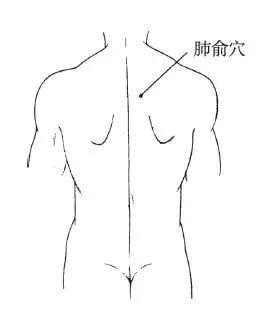 The Bai Liao acupoints are located on the sacrum, divided into upper, middle, and lower Bai Liao, totaling eight acupoints, located in the first, second, third, and fourth sacral foramina, collectively known as the “Eight Points.” The Bai Liao acupoints have the effect of clearing heat and draining dampness and can be massaged twice daily for 15 minutes each time, which is particularly suitable for those with a damp-heat constitution leaning towards damp-heat descending.
The Bai Liao acupoints are located on the sacrum, divided into upper, middle, and lower Bai Liao, totaling eight acupoints, located in the first, second, third, and fourth sacral foramina, collectively known as the “Eight Points.” The Bai Liao acupoints have the effect of clearing heat and draining dampness and can be massaged twice daily for 15 minutes each time, which is particularly suitable for those with a damp-heat constitution leaning towards damp-heat descending.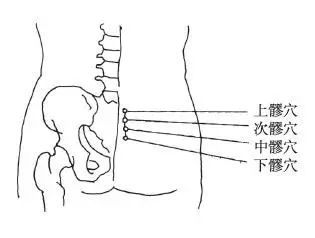 5. Herbal Remedies for Eliminating Damp-HeatYin Chen Herbal Tea (茵陈药茶)
5. Herbal Remedies for Eliminating Damp-HeatYin Chen Herbal Tea (茵陈药茶)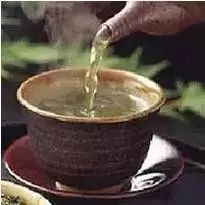 This herbal tea consists of 30 grams of Yin Chen (茵陈, Artemisia capillaris), 6 grams of Da Huang (生大黄, Rhubarb), and 10 grams of green tea, steeped in water to drink daily. It is particularly suitable for those with a damp-heat constitution presenting with cholecystitis, as it can clear heat, drain dampness, and promote bowel movement.San Ren Decoction (三仁汤)
This herbal tea consists of 30 grams of Yin Chen (茵陈, Artemisia capillaris), 6 grams of Da Huang (生大黄, Rhubarb), and 10 grams of green tea, steeped in water to drink daily. It is particularly suitable for those with a damp-heat constitution presenting with cholecystitis, as it can clear heat, drain dampness, and promote bowel movement.San Ren Decoction (三仁汤)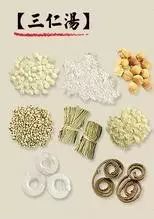 San Ren Decoction was created by the Qing Dynasty warm disease scholar Wu Jutong and is recorded in the book “Wen Bing Tiao Bian.” The ingredients include 15 grams of Xing Ren (杏仁, Apricot Kernel), 18 grams of Hua Shi (滑石, Talcum), 6 grams of Bai Tong Cao (白通草, White Herb), 6 grams of Bai Dou Kou (白蔻仁, White Cardamom), 6 grams of Zhu Ye (竹叶, Bamboo Leaf), 6 grams of Hou Po (厚朴, Magnolia Bark), 18 grams of Sheng Yi Ren (生苡仁, Job’s Tears), and 10 grams of Ban Xia (半夏, Pinellia). The main ingredients are Xing Ren, Bai Dou Kou, and Sheng Yi Ren, hence the name “San Ren Decoction.” Its primary function is to clear damp-heat from the three burners and promote the flow of qi in the three burners. However, due to the toxicity of Ban Xia, San Ren Decoction should be used under the guidance of a TCM practitioner.Warm ReminderIn many cases, medications for eliminating damp-heat are bitter and cold, but those with a damp-heat constitution should not overuse cold and cooling herbs. This is because bitter and cold medicines can harm the spleen yang and hinder the spleen’s ability to transform and transport fluids, which can exacerbate dampness. In the process of adjusting the constitution, we should combine clearing and draining with warming and invigorating herbs, aiming to warm the spleen and promote qi flow, ensuring smooth circulation of qi and blood without stagnation.■【Source: Reading Traditional Chinese Medicine, content excerpted from “Manual for Using Nine Types of Constitutions,” published by China Traditional Chinese Medicine Press, authored by Wang Qi】
San Ren Decoction was created by the Qing Dynasty warm disease scholar Wu Jutong and is recorded in the book “Wen Bing Tiao Bian.” The ingredients include 15 grams of Xing Ren (杏仁, Apricot Kernel), 18 grams of Hua Shi (滑石, Talcum), 6 grams of Bai Tong Cao (白通草, White Herb), 6 grams of Bai Dou Kou (白蔻仁, White Cardamom), 6 grams of Zhu Ye (竹叶, Bamboo Leaf), 6 grams of Hou Po (厚朴, Magnolia Bark), 18 grams of Sheng Yi Ren (生苡仁, Job’s Tears), and 10 grams of Ban Xia (半夏, Pinellia). The main ingredients are Xing Ren, Bai Dou Kou, and Sheng Yi Ren, hence the name “San Ren Decoction.” Its primary function is to clear damp-heat from the three burners and promote the flow of qi in the three burners. However, due to the toxicity of Ban Xia, San Ren Decoction should be used under the guidance of a TCM practitioner.Warm ReminderIn many cases, medications for eliminating damp-heat are bitter and cold, but those with a damp-heat constitution should not overuse cold and cooling herbs. This is because bitter and cold medicines can harm the spleen yang and hinder the spleen’s ability to transform and transport fluids, which can exacerbate dampness. In the process of adjusting the constitution, we should combine clearing and draining with warming and invigorating herbs, aiming to warm the spleen and promote qi flow, ensuring smooth circulation of qi and blood without stagnation.■【Source: Reading Traditional Chinese Medicine, content excerpted from “Manual for Using Nine Types of Constitutions,” published by China Traditional Chinese Medicine Press, authored by Wang Qi】

